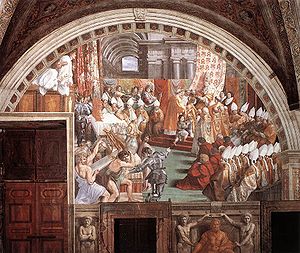As my co-blogger Jonathan Pearce has mentioned already, something very interesting is going on in Massachusetts these days.
A family in suburban Boston hopes to change the phrasing of the Pledge of Allegiance to remove two words they claim violate students’ rights. The family is challenging the pledge, which students recite daily in U.S. public schools, claiming the words “under God” violate the state’s equal rights laws.
The plaintiffs, who have requested anonymity through their lawyers, are taking an unconventional approach to challenging the pledge.
Since the addition of the phrase “under God” in 1954, the pledge has been challenged repeatedly as a violation of the separation of church and state. In 2004, one case reached the Supreme Court, but ultimately failed, as have all previous challenges.
But the current case before the state’s Supreme Judicial Court, Doe v. Acton-Boxborough Regional School District, is different because lawyers for the plaintiffs, an anonymous atheist couple, won’t be arguing about federal law but rather that the compulsory recitation of the pledge violates the state’s equal rights laws. They argue that the daily recitation of the pledge is a violation of their guarantee of equal protection under those laws.
This change of tack in pledge challenges is modeled on a successful precedent laid down in the same court on gay marriage. In 2003, Massachusetts’ Supreme Judicial Court ruled 4-3 in favor of a same-sex couple seeking the right to marry under the state’s equal rights laws. Their win led to similar successful challenges in other state courts — something that could happen here if judges rule for the plaintiffs.
The plaintiffs were represents by the wonderful David Niose.
The defendants were represented by a theocratic Christian group named the Becket Fund.
Eric Rassbach, deputy general counsel for the Becket Fund for Religious Liberty, intervened on behalf of a family in the Acton-Boxborough Regional School District, the defendant in the case, who would like to have their child continue reciting the pledge as it is presently written.
“Most people do not view reciting the Pledge of Allegiance as saying a prayer,” Rassbach said. “It would be terrible to enshrine in the law this kind of allergy to God that the plaintiffs have.”
So what exactly is the Pledge, if not a prayer? In the words of the Becket Fund itself,
The secular Humanist Plaintiffs in this case have tried a new twist on an old theme, focusing on the argument that the Pledge discriminates against Atheists, rather than that it establishes a religion. But their premise requires the same old arguments rejected in past cases: that the Pledge is a prayer or a theological statement. The Becket Fund has successfully refuted this argument in federal courts by explaining that the words ‘under God’ have the important political meaning that our rights are not limited by the state, but come from a higher power.
Eh…the statement that our rights come from a “higher power” is not theological? Really? Funny those who seek to violate the Constitution come up with a new absurdity every day, from the statement on individual rights coming from God “not being theological” to Christianity “not being a religion” (LOL).
It may put things in context to remember where the Becket Fund gets its name.
Thomas Becket was born in around 1120, the son of a prosperous London merchant. He was well educated and quickly became an agent to Theobald, Archbishop of Canterbury, who sent him on several missions to Rome. Becket’s talents were noticed by Henry II, who made him his chancellor and the two became close friends. When Theobald died in 1161, Henry made Becket archbishop. Becket transformed himself from a pleasure-loving courtier into a serious, simply-dressed cleric.
The king and his archbishop’s friendship was put under strain when it became clear that Becket would now stand up for the church in its disagreements with the king. In 1164, realising the extent of Henry’s displeasure, Becket fled into exile in France, and remained in exile for several years. He returned in 1170.
On the 29 December 1170, four knights, believing the king wanted Becket out of the way, confronted and murdered Becket in Canterbury Cathedral.
Becket was made a saint in 1173 and his shrine in Canterbury Cathedral became an important focus for pilgrimage.
In other words, the Becket Fund for Religious Liberty honors a man seen as an example of the clergy taking a stand against governments, and paying a heavy price in the process…which makes it very interesting, that they are now trying to get the state to be firmly on the side of religion, which, minor hiccups not withstanding, has been the case for most of history.

And now, the Becket Fund is worried that a win for Freethinkers in this case would lead to similar cases in other states-just as Massachusetts was the first state to give gays equality under the law, but not the last one.
Rassbach is worried that if the state Supreme Court rules in favor of the plaintiffs, the case would spur copycat lawsuits in other states with similar equal rights’ laws. “If they succeed in their goals here,” he said, “they will attempt to replicate it elsewhere.”
From your lips to God’s ears!
